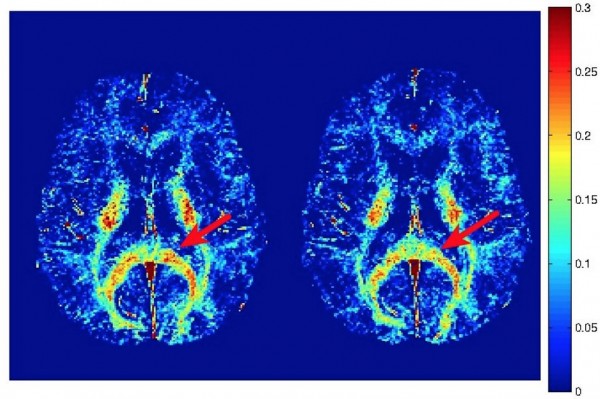By Steve Pak, | April 06, 2016

White Matter Disruption
Sleep deprivation is linked to problems related to the human brain's white matter, which creates links and transfers data between different regions of the brain based to a new study. They discovered that insomnia affects areas in the brain related to regulating sleep, wakefulness, and cognitive function.
Like Us on Facebook
White matter tracts are groups of long nerve cell strands that connect different brain regions. Researcher Shumei Li works at the department of Medical Imaging at No. 2 Provincial People's Hospital in Guangzhou in China. She explained that if they are damaged it prevents the different areas of the brain from communicating properly, according to Health.
The study found a link between problems with white tract matter and sleepless nights but did not find a cause-and-effect relationship.
People who suffer with primary insomnia have constant problems falling asleep or staying asleep. The researchers explain that the tossing and turning at night is not linked to issues such as medical conditions.
This result ins in various results. They include daytime tiredness, problems with brain functioning, and sometimes anxiety or depression.
Li explained that the primary insomnia sleep disorder is common and affects up to 5 percent of adults. However, researchers are not certain of the causes or results.
The study included 23 people with primary insomnia and 30 healthy participants. The subjects all completed surveys so researchers could evaluate their sleep patterns and mental state.
Researchers also used a magnetic resonance imaging (MRI) method called diffusion tensor imaging (DTI) and studied water movement's pattern in white matter.
Scientists learned that insomnia sufferers had lower white matter integrity in many brain regions. That includes the thalamus that controls functions such as sleep and alertness; and the thalamus that connects the brain's two halves.
The Cleveland Clinic's Dr. Douglas Moul argued that the new study does not help scientists to better understand why sleep is important. He pointed out that sleep is an important time when the brain maintains and repairs itself.
In related news, in Arianna Huffington's new book "The Sleep Revolution" she explains that she was only getting three or four hours of sleep in 2007, and drinking a lot of caffeinated drinks, according to Vogue. However, one day she collapsed. That caused her to change her daily schedule to make sure to get at least seven hours of shut-eye per night.
Here's how to sleep better:
-
Use of Coronavirus Pandemic Drones Raises Privacy Concerns: Drones Spread Fear, Local Officials Say

-
Coronavirus Hampers The Delivery Of Lockheed Martin F-35 Stealth Fighters For 2020

-
Instagram Speeds Up Plans to Add Account Memorialization Feature Due to COVID-19 Deaths

-
NASA: Perseverance Plans to Bring 'Mars Rock' to Earth in 2031

-
600 Dead And 3,000 In The Hospital as Iranians Believed Drinking High-Concentrations of Alcohol Can Cure The Coronavirus

-
600 Dead And 3,000 In The Hospital as Iranians Believed Drinking High-Concentrations of Alcohol Can Cure The Coronavirus

-
COVID-19: Doctors, Nurses Use Virtual Reality to Learn New Skills in Treating Coronavirus Patients











